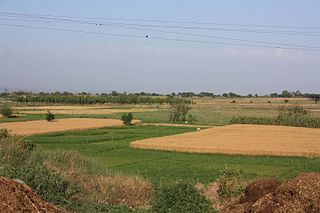IIT Ropar Lab to Address Farmers' Soil and Water Related Issues
Published on by Water Network Research, Official research team of The Water Network in Academic
Indian Institute of Technology (IIT) Ropar has allocated 2.5 acres of land in the new campus for setting up a state-of-art soil-water-plant lab to address the issues related to soil and water, faced by the farmers in Punjab.

Punjab Farm, source: Wikimedia Commons by Musa1i
IIT Ropar plans to take up initiatives in the area of water resources aimed at addressing problems like falling water table, water logging, deteriorating water quality, floods, droughts, changing rainfall patterns accentuated by impending climate change.
Under the project, the department has adopted the Sutlej-Beas Doab Region including the Harike Wetlands (7900 sq. hectares) and wetlands around Ropar region to analyze the falling/ deteriorating grounds level patterns.
“Depleting water table and the quality of soil & water has been an ongoing issue in the Punjab region. Our research will lead to outcome driven suggestions, which will be passed on to the State government for implementation,” said Deepak Kashyap, Head of Civil Engineering Department, IIT Ropar heading this initiative.
Read full article: The Economic Times
Media
Taxonomy
- Agriculture
- Irrigation
- Agriculture
- Drought
- Consumption
- Crop Farming
- Farms
- irrigation agronomy
- India
1 Comment
-
Hello what's interesting in this project is that there is a point of experimentation. What is practically over.
The topic is interesting but if it is based on the knowledge of research with current data, there will be little progress.
If the topic is interesting there still a problem: the water. This element is related to multiple objectives and it is difficult to identify the same purpose in the same experiment.
- water and its use
- water from the groundwater
- the taking of water in aquifers - water for biodiversity
- watering of farms.
- the need to water the farm - water quality of the groundwater
- deterioration of the quality of water from groundwater
- innovation, drought,
The problem of drinking water is intimately linked to the problem of wastewater management his main source of pollution.
By trying to treat all these topics in a topic, which obviously are directly related, each other, we do nothing because we mix everything.
ALL the "Vivant" on Earth needs water to live and it does so in a natural way as innate because it arises from a need. ""
But we don't target these days to find a solution to this problem is the following: no longer lose water.
We completely forget that water has always been free of charge since the dawn of time, but society, in fact, a product of financial profitability.
Water consumption is universal and based on:
-on the one hand supply - another one resource financial.
Therefore so on the principle that water consumption cannot be avoided even with awareness consume less, to just try to see the other side of the bezel.
NO LONGER LOSE WATER USED
Urban planning has created all alone, without organization, without priority, as the diagram shows in Africa in countries in the process of accelerated development. Growing Habitat excessively, feeding habitat, running water, electricity, and nobody cares about the consequences that there.
Water loss, overconsumption, decongestion of sanitation, badly structured sanitation, alternative remediation never bringing a final solution.
After we make the connection between consumption of the habitat and the consumption of the farmers to develop their agricultural production.
It cannot be a relationship between habitat and a farm to the level of consumption, it's unreal.
Both consume for a vital need.
On the other hand we can work on both consumed water from the point of view of habitat loss, that from the point of view of agricultural industrial consumers.
We can further reasoning based on the principle which need water consumed Habitat serves the need of water use by farms.
In mind we're entirely on the vision of losing water on the part of the habitat. But we're also on the vision of losing water on the part of farmers since they will use a specific water.
Therefore the two visions superimposed and v were in the same direction: substantial reduction in the levy of water from underground reserves, economics of groundwater reserves.
But we're pushing thinking even further. If we reject more polluting water in the environment, it removes managed soils, under soil pollution risk and reserves of groundwater.
Lyseconcept provides a comprehensive solution to your project while adding an important additional element. Farmers will no longer be the use of chemical fertilizers since they will be supplied with natural fertilizer.
Of course that this service can be done by the application of strict rules at the level of water consumption in the habitat.
What makes that increasingly we will act on the reduction of use of industrial chemicals, and chemical maintenance products
A reserve to do habitat is no idea to preserve the feature - organic - water it consumes by injecting into the chemicals consumed water. It's already at this level that we must work first.